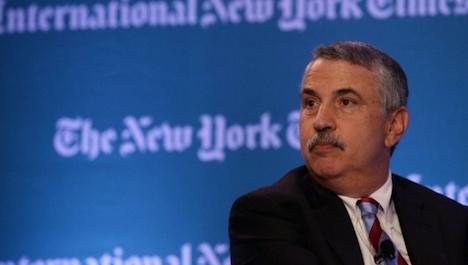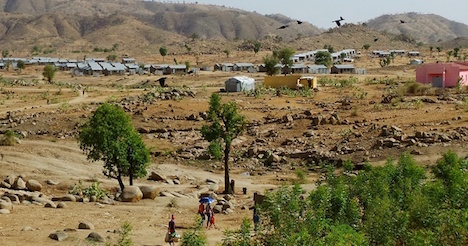|

|
Gardening in Africa with The New York Times' Thomas Friedman
 Print This Print This
By Belén Fernández
teleSUR
Tuesday, May 3, 2016
 |
| New York Times columnist Thomas Friedman once wrote that the newspaper pays him to be a "tourist with an attitude." | Photo: AFP |
The writer who once bragged of eating McDonald's in 14 different countries after his first year as a columnist recently visited Africa.
Africa is not a frequent destination of New York Times foreign affairs columnist and corporate globalization fiend Thomas Friedman, despite his unlimited travel budget and what amounts to a free pass to write whatever he wants whether it makes sense or not.
When he does manage to get over to Africa, of course, he produces some important insights.
[Editor's Note: For further information concerning Mr Friedman's failings, see my article here]
Back in 2009, for example, he descended upon Botswana to report that neither his BlackBerry, wireless laptop, or satellite phone functioned in the Okavango Delta. One hundred twenty-one words of that particular column were devoted to a description of a leopard eating an antelope in a tree.
This month, a return trip to the continent has thus far produced two articles, predictably titled “Out of Africa” and “Out of Africa, Part II.”
The first one is datelined Agadez, Niger, which Friedman describes as the “main launching pad for migrants out of West Africa.” According to our tour guide’s calculations, “between 9,000 and 10,000 men” are launched in the direction of Libya each month.
The second dispatch is from the remote village of Ndiamaguene, Senegal, which we’re told constitutes “the headwaters of the immigration flood now flowing from Africa to Europe via Libya.” Citing a near-total absence of young and middle-aged men in the town, Friedman explains that “they’ve all hit the road” in search of economic relief because Ndiamaguene’s “climate-hammered farmlands can no longer sustain them.”
He continues:
“This trend is repeating itself all across West Africa, which is why every month thousands of men try to migrate to Europe by boat, bus, foot or plane. Meanwhile, refugees fleeing wars in Syria, Iraq and Afghanistan are doing the same. Together, these two flows pose a huge challenge for the future of Europe.”
Never mind that the Iraqi and Afghan “flows” happen to be fleeing wars overzealously championed by none other than Friedman himself. Perhaps Europe can bill him for damages.
Meanwhile, Friedman concludes his foray into the West African plight with this prescription: “Gardens or walls? It’s really not a choice. We have to help [the Africans] fix their gardens because no walls will keep them home.”
Leaving aside the fact that the word “gardens” appears nowhere else in his two-part series and that it’s thus a bit unclear as to how we arrived at this particular choice, let’s take the metaphor and run with it—for just long enough to point out that the garden solution is fundamentally irreconcilable with the economic system Friedman and his ilk have devoted their lives to promoting.
Recall his exuberant assessment that “globalization is bringing more people out of poverty faster than ever before in the history of the world” — or his helpful reminder: “You win the [U.S.] presidency by connecting with the American people’s gut insecurities and aspirations. You win with a concept. The concept I’d argue for is ‘neoliberalism.’”
But seeing as neoliberal globalization happens to be predicated on the financial subjugation of the majority of the globe’s inhabitants, any gardening tricks taking place within this context will inevitably be superficial.
During my own recent trip to Ethiopia, I encountered some additional “headwaters of the immigration flood” in camps for Eritrean refugees, many of whom risk their lives to travel from Ethiopia across Sudan, Libya, and the Mediterranean in order to threaten “the future of Europe.”
A February article on the website of the U.N. Refugee Agency notes that “after Syrians, Afghans, and Iraqis, Eritreans were the fourth most common group of refugees trying to cross the Mediterranean to Europe in 2015” and that “recent surveys in the six refugee camps hosting Eritreans in Ethiopia found that 82,000 were no longer present in the camps and were so far unaccounted for.”
 |
| Hitsats Refugee camp in Shire, Ethiopia. Photo by Belén Fernández |
I visited a camp called Hitsats in a desolate area about an hour away from the northern Ethiopian town of Shire, where refugees spend their days contending with heat and dust. Shoeless children sporting Eritrea soccer shirts figure prominently into the scene.
Outside a small church being painted by a group of refugees, I spoke with a young and apparently ill man sitting on the ground who told me of his reasons for fleeing his repressive homeland: like so many other Eritreans, he had been conscripted into seemingly eternal military service that is often indistinguishable from slavery.
After eight years of army life, the man had escaped to Ethiopia in 2015. He feared that his mother — with whom he had not communicated since — may have been punished by the government following his departure.
He reasoned that, although conditions in Eritrea had been bad, conditions in the camp were also bad. He lacked the thousands of dollars necessary to attempt the journey to Europe, and if he went home, he’d be thrown into jail and then reinserted into the army.
Where, then, to begin the gardening?
As a representative of a European NGO operating in the region confirmed to me, a current aim of certain “humanitarian” organizations is to curb the flow of migrants in the direction of Europe. In this effort are naturally tied up various funds from rightwing, xenophobic European entities.
Offering secondary education in the refugee camps is one option being explored as a means of encouraging Eritreans to stay put in Ethiopia rather than continue onward. But the fact that Eritreans are prohibited from legally working in Ethiopia means that even an advanced degree won’t translate into any significant opportunities.
In the meantime, the migration industry has spelled big bucks for more than just human trafficking rings. Many a Western NGO has earned a pretty penny ostensibly attending to the needs of the world’s surplus humans, while the prevailing economic system regularly evades blame for its role in migratory patterns.
Perhaps we should focus on fixing our own garden first.
Belén Fernández is the author of “The Imperial Messenger: Thomas Friedman at Work,” published by Verso. She is a contributing editor at Jacobin magazine.
Source URL
|
 Print This Print This

|
If you appreciated this article, please consider making a donation to Axis of Logic.
We do not use commercial advertising or corporate funding. We depend solely upon you,
the reader, to continue providing quality news and opinion on world affairs. Donate here
|
 |
World News

|

